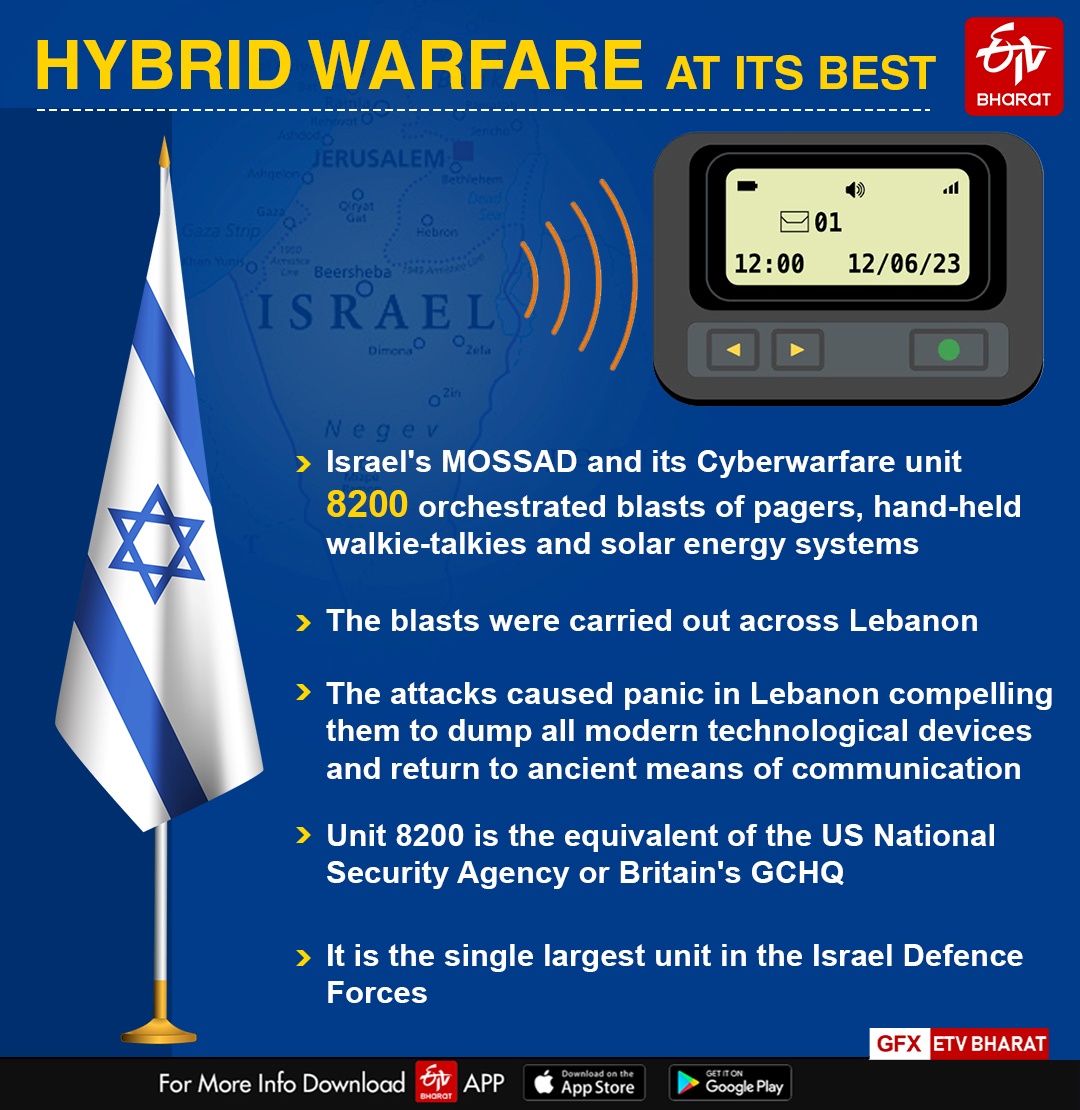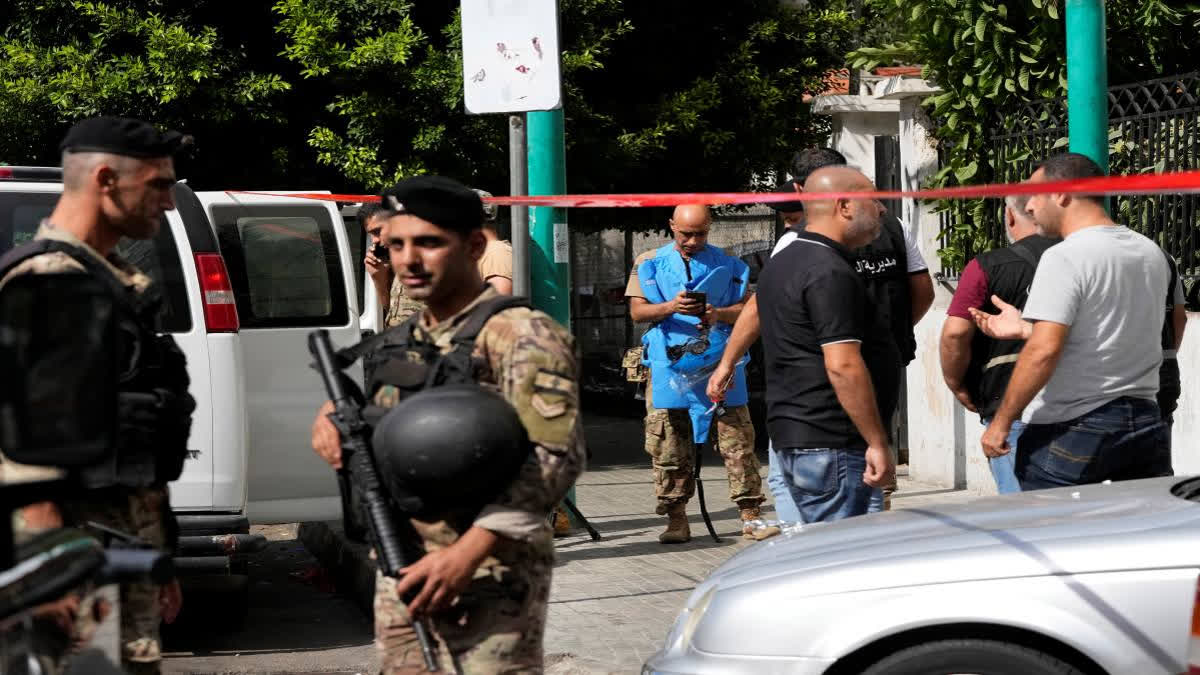While exact details of how Israel's MOSSAD and its Cyberwarfare unit 8200 orchestrated blasts of pagers, hand-held walkie-talkies and solar energy systems across Lebanon would never flow, it has raised hybrid warfare to new levels. The attacks caused panic in Lebanon compelling them to dump all modern technological devices and return to ancient means of communication.
It also created uncertainty and confusion within the minds of Hezbollah leaders, giving Israelis time and space to redeploy their forces for an offensive. It also brought to the fore risks emerging from electronic devices.
Unit 8200, as per the Jerusalem Post, 'is the equivalent of the US National Security Agency or Britain's GCHQ and is the largest single military unit in the Israel Defence Forces. Its tasks range from signals intelligence to data mining to cyberattacks. It has been involved in earlier incidents including employing cyber strikes to disable Iranian nuclear centrifuges. The unit is known to use Artificial Intelligence to select Hamas targets. Its reputation was marred by its failure to detect the 07 October attacks resulting in the resignation of its head.
Media reports speculate that Israel managed to intercept mass orders from Hezbollah for multiple communication equipment and modified them by planting explosives and chips to enable their detonation via radio signals. The companies believed to have manufactured the devices which exploded have refuted any allegations, adding to the belief that orders were placed on a shell company, owned by Israel operatives.
The US has denied being aware or involved, though a CNN report mentions that the US was intimated of an upcoming attack, without details being shared. While Israel has refused to comment, its defence minister, Yoav Gallant, mentioned, "We are at the beginning of a new era in this war and we need to adapt ourselves." This is the closest that the Israelis have come to admitting. For the world, hybrid warfare has now entered a dangerous phase where common humans are at risk.

Were explosives planted in the devices as claimed or were similar lot manufactured batteries exploded by using electronic signals is unclear. Hackers have confirmed that it is possible to employ malware to remotely tamper a device, but possibly not at levels witnessed. Hezbollah was compelled to switch to pagers once they realised that Israelis were locating senior commanders based on mobile signals and targeting them in specific strikes. With these strikes even pagers and hand-held walkie-talkies are risky in Lebanon. This impacts Hezbollah communication, an essential pre-requisite in warfare.
This tactical operation by Israel would have strategic impacts, initially in its battles with multiple terrorist organisations as also globally. Hezbollah will be compelled to retaliate however with communications back to stone-age it would not be easy. Confusion would prevail within their leadership for some time. This will be exploited by the Israelis.
There will be growing unease on the possible existence of Israeli spies within Hezbollah hierarchy who could have leaked details on orders of communication devices to the MOSSAD may lead to a witch hunt, enhancing distrust. While deaths were few, the injuries would impact Hezbollah as most injured were middle-ranked functionaries. Other terrorist groups, engaged in conflict with Israel will now be careful on exploiting electronic communication devices.
Within Israel, there are fears of a major retaliation including rocket assaults from Hezbollah and its allies. Retaliation could cause casualties, despite an Israeli threat of a military offensive. A ceasefire, which was possible a few days ago, now appears history. The security of Israel’s hostages in Hamas custody would remain a question mark. Iran’s proxies will now join together in targeting Israel.
Benjamin Netanyahu, the Israeli PM, has achieved his goal of expanding the conflict. It will secure his chair for some more time. The operation was launched based on his promise of moving displaced Israelis, withdrawn due to attacks by Hezbollah, back to their homes in Northern Israel. An expanded conflict would block any protests for his removal as also compel the US into backing it. Hopes of peace and a ceasefire have gone up in smoke.
The first anniversary of the Hamas attack is around the corner and Israel is nowhere close to achieving its war aims. It appears to possess no strategy nor end state. On the contrary, it has drawn more terrorist groups into the conflict. Across the region, loss of lives and destruction have been high.
Iran, which transported almost a hundred injured Hezbollah soldiers to their country for medical treatment, would be considering the possibility of a similar attack within their borders. Its centrifuges were disabled by Israel in an earlier cyberattack. The same could be repeated. The US has cautioned Iran on retaliating in response to the attacks in Lebanon.
Globally, nations are moving towards secure networks with locally developed software embedded into the systems for their top civil and military functionaries. For this, they place orders for a large number of mobile sets from trusted companies. These are then modified. The intent is to prevent locations of senior commanders from being compromised as also communications from being hacked. The Israeli action would necessitate that all such devices be rechecked for any malware, which would be a costly exercise but cannot be ignored.
The population at large, mainly in nations which import electronic hardware from China or other adversary countries, would be concerned on similar malware within their equipment. Governments would be pushed to reduce procurement from hostile nations while increasing local production.
Nations would now seek to study the Israeli model and attempt to possibly develop technology for better targeting their adversaries. Hybrid warfare has now entered a new phase. Many sensitive locations insist that its personnel employ basic mobile phones without internet to prevent locations being tracked.
Legally, the attack could be termed as a booby trap, which is internationally banned. However, Israel would deny that it was involved in the attack. While single mobile phones can still be detonated, research would now move towards mass actions. It is a repeat of history. The US was the first to employ drones in offensive roles, currently every nation as also terrorist groups possesses them. Israel has shown a path, that others would follow. The world would now be a riskier place.
(Disclaimer: The opinions expressed in this article are those of the writer. The facts and opinions expressed here do not reflect the views of ETV Bharat)



